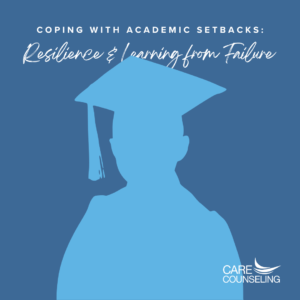Navigating Academic Setbacks with Resilience
 The journey through education is marked not only by successes but also by inevitable academic setbacks. These setbacks can come in the form of low grades, failed exams, or unmet expectations. While facing such challenges can be disheartening, they also present opportunities for growth, learning, and the cultivation of resilience.
The journey through education is marked not only by successes but also by inevitable academic setbacks. These setbacks can come in the form of low grades, failed exams, or unmet expectations. While facing such challenges can be disheartening, they also present opportunities for growth, learning, and the cultivation of resilience.
Embrace the Growth Mindset
- Embrace the Growth Mindset:
Adopting a growth mindset means viewing setbacks as opportunities for learning and growth. Instead of seeing failures as a reflection of your abilities, consider them as a chance to improve and refine your skills.
- Reflect and Learn:
After experiencing an academic setback, take time to reflect on what led to the challenge. Analyze your study methods, time management, and preparation strategies. Identifying areas for improvement sets the stage for a more successful approach in the future.
- Seek Feedback:
Reach out to your instructors to discuss your performance and ask for feedback. Understanding where you went wrong and how you can improve provides valuable insights for moving forward.
Build Resilience
- Practice Self-Compassion:
Be kind to yourself. Remember that setbacks are a natural part of any journey. Avoid self-criticism and negative self-talk, and instead, offer yourself the same empathy you’d offer a friend.
- Resilience Through Adversity:
Overcoming academic challenges can build your resilience muscle. Just as weightlifting strengthens your body, navigating setbacks strengthens your ability to bounce back and thrive.
- Reframe Failure:
Challenge the notion of failure as a negative outcome. Instead, view it as a stepping stone toward success. The road to achievement is often paved with learning from mistakes.
Strategies for Bouncing Back
- Set Realistic Goals:
Break down your academic goals into smaller, achievable milestones. Celebrate your progress along the way, and remember that success is a series of steps.
- Develop a Resilience Toolkit:
Identify strategies that help you cope with stress and setbacks. These might include exercise, mindfulness, journaling, or seeking support from friends and family.
- Maintain Perspective:
While academic pursuits are important, they’re just one aspect of your life. Remember your broader goals and the many strengths and talents you possess beyond academics.
- Seek Support:
Don’t hesitate to reach out for support when facing challenges. Friends, family, mentors, and counselors can provide guidance, encouragement, and a listening ear.
Turning Setbacks into Opportunities for Growth
- Analyze Your Approach:
Use setbacks as a chance to assess your study methods and habits. Experiment with new techniques and strategies that align with your learning style.
- Learn from Mistakes:
Every setback offers a lesson. Analyze what went wrong, but also focus on what you can do differently next time. Viewing setbacks as learning experiences empowers you to make positive changes.
- Develop Resilience Strategies:
Every challenge presents an opportunity to enhance your resilience toolkit. The more you navigate setbacks, the better equipped you become at handling future hurdles.
- Build Adaptability:
Academic setbacks teach you to adapt to changing circumstances. This adaptability is a crucial skill that will serve you well in both your academic and personal life.
Academic setbacks are not signs of failure but rather steppingstones toward growth and resilience. By adopting a growth mindset, practicing self-compassion, and seeking support, you can navigate challenges with grace and emerge stronger. Embrace the opportunity to learn from mistakes, refine your approach, and build the skills that will contribute to your long-term success. Remember, setbacks are not the end of your journey; they’re valuable detours that lead you closer to your goals. As you face academic challenges head-on, you’ll uncover your inner strength and capacity to rise stronger, wiser, and more resilient than ever before.



























